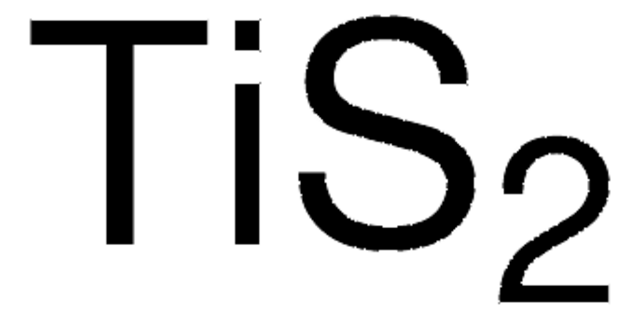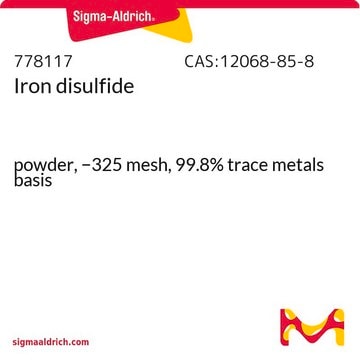343226
Nickel sulfide
99.7% trace metals basis, −150 mesh
Sinónimos:
Nickel subsulfide
About This Item
Productos recomendados
Análisis
99.7% trace metals basis
formulario
powder
idoneidad de la reacción
reagent type: catalyst
core: nickel
tamaño de partícula
−150 mesh
densidad
5.8 g/mL at 25 °C (lit.)
aplicaciones
battery manufacturing
cadena SMILES
[Ni]=S=[Ni]=S=[Ni]
InChI
1S/3Ni.2S
Clave InChI
YGHCWPXPAHSSNA-UHFFFAOYSA-N
Categorías relacionadas
Descripción general
Aplicación
Envase
Palabra de señalización
Danger
Frases de peligro
Consejos de prudencia
Clasificaciones de peligro
Acute Tox. 3 Inhalation - Aquatic Acute 1 - Aquatic Chronic 1 - Carc. 1A Inhalation - Muta. 2 - Skin Sens. 1 - STOT RE 1 Inhalation
Órganos de actuación
Lungs
Código de clase de almacenamiento
6.1D - Non-combustible acute toxic Cat.3 / toxic hazardous materials or hazardous materials causing chronic effects
Clase de riesgo para el agua (WGK)
WGK 3
Punto de inflamabilidad (°F)
Not applicable
Punto de inflamabilidad (°C)
Not applicable
Equipo de protección personal
Eyeshields, Faceshields, Gloves, type P3 (EN 143) respirator cartridges
Certificados de análisis (COA)
Busque Certificados de análisis (COA) introduciendo el número de lote del producto. Los números de lote se encuentran en la etiqueta del producto después de las palabras «Lot» o «Batch»
¿Ya tiene este producto?
Encuentre la documentación para los productos que ha comprado recientemente en la Biblioteca de documentos.
Los clientes también vieron
Nuestro equipo de científicos tiene experiencia en todas las áreas de investigación: Ciencias de la vida, Ciencia de los materiales, Síntesis química, Cromatografía, Analítica y muchas otras.
Póngase en contacto con el Servicio técnico













